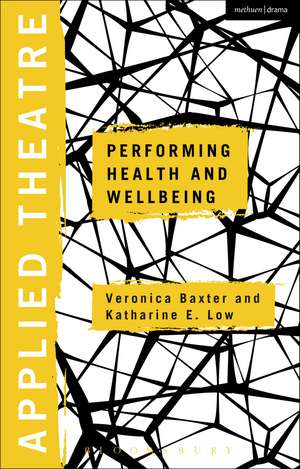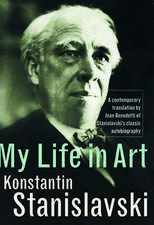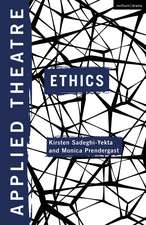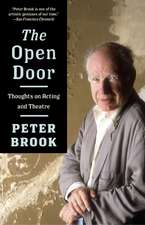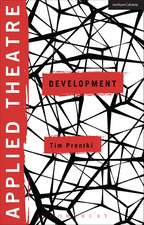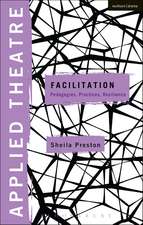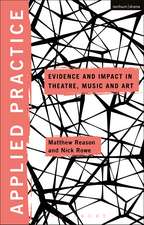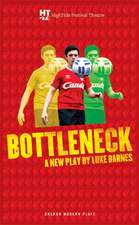Applied Theatre: Performing Health and Wellbeing: Applied Theatre
Editat de Dr Veronica Baxter, Dr Katharine E. Low Prof Michael Balfour, Dr Sheila Prestonen Limba Engleză Paperback – 25 ian 2017
| Toate formatele și edițiile | Preț | Express |
|---|---|---|
| Paperback (1) | 180.44 lei 43-57 zile | +47.09 lei 5-11 zile |
| Bloomsbury Publishing – 25 ian 2017 | 180.44 lei 43-57 zile | +47.09 lei 5-11 zile |
| Hardback (1) | 657.29 lei 43-57 zile | |
| Bloomsbury Publishing – 25 ian 2017 | 657.29 lei 43-57 zile |
Preț: 180.44 lei
Preț vechi: 208.60 lei
-13% Nou
Puncte Express: 271
Preț estimativ în valută:
34.53€ • 35.96$ • 29.18£
34.53€ • 35.96$ • 29.18£
Carte tipărită la comandă
Livrare economică 10-24 martie
Livrare express 31 ianuarie-06 februarie pentru 57.08 lei
Preluare comenzi: 021 569.72.76
Specificații
ISBN-13: 9781472584571
ISBN-10: 1472584570
Pagini: 344
Ilustrații: 10 b/w illus
Dimensiuni: 138 x 216 x 24 mm
Greutate: 0.43 kg
Editura: Bloomsbury Publishing
Colecția Methuen Drama
Seria Applied Theatre
Locul publicării:London, United Kingdom
ISBN-10: 1472584570
Pagini: 344
Ilustrații: 10 b/w illus
Dimensiuni: 138 x 216 x 24 mm
Greutate: 0.43 kg
Editura: Bloomsbury Publishing
Colecția Methuen Drama
Seria Applied Theatre
Locul publicării:London, United Kingdom
Caracteristici
Applied theatre is a large sub-discipline within theatre studies with modules attracting large cohorts of students. In addition there are many practitioners who would find this useful
Notă biografică
Katharine E. Low is a lecturer in Applied Theatre and Community Performance at the Royal Central School of Speech and Drama, University of London, UK. She has previously researched and facilitated practice in Tanzania and South Africa with specific reference to sexual health and local responses to HIV/AIDS prevention, as well as working with HIV+ refugee women in Manchester. Dr Veronica Baxter is the convenor of the Honours programme and the Masters in Applied Theatre at the University of Cape Town, South Africa, and has taught at South African and English universities for 25 years, focusing on applied theatre and drama, directing, theatre history and South African theatre.
Cuprins
Part 1Introduction Katharine Low1 Understanding Health, Wellbeing, the Millennium Development Goals and Health Inequities Katharine Low2 Aesthetics, Instrumentalism and Ethics in Health and Wellbeing Veronica Baxter Part 23 Ageing: Dementia Care, Death and Dying (the UK and North America) 3.1 Introduction Katharine Low 3.2 Essay - Participatory theatre and dementiaNicola Hatton 3.3 Interview - 'A discussion about death? I feel more alive now' Sue Mayo in conversation with Liz Rothschild, Director of Kicking the Bucket: A Festival of Living and Dying 4 Communicable Diseases: Tuberculosis (South Africa), Malaria (Malawi) and Dengue Fever (Brazil)4.1 Introduction Katharine Low 4.2 Essay - Tuberculosis: The forgotten plagueVeronica Baxter and Michele Tameris 4.3 Snapshot - Dialogical theatre: Reconsidering the role of Theatre for Development for malaria prevention in MalawiZindaba Dunduzu Chisiza4.4 Interview - Public Enemy No. 1: Dengue fever in the favelas of Brazil Johayne Hildefonso is interviewed by Jan Onoszko 5 Non-Communicable Diseases: Lifestyle and Post-Colonial Stress Disorder (Canada), Nutrition and Health Eating (Denmark), Diabetes (UK) 1215.1 IntroductionKatharine Low5.2 Essay - 'Acting Out' our health: Assisting youth in making healthy lifestyle choices through linkingIndigenous perspectives about wellbeing with Applied TheatreJulian Robbins, Warren Linds, Linda Goulet, Jo-Ann Episkenew and Karen Schmidt5.3 Snapshot - Health theatre for childrenDan Grabowski and Jens Aagaard-Hansen 5.4 Snapshot - Creativity and change in the lifestyles of South Asian communities in YorkshireGeetha Upadhyaya 6 Sexual Health: Practice from South Africa and the Asia- Pacific Region 1456.1 IntroductionVeronica Baxter6.2 Essay - 'It's difficult to talk about sex in a positive way': Creating a space to breathe Katharine Low 6.3 Snapshot - Performing the solution: Cautions and possibilities when using theatre conventions within HIV prevention programmesHelen Cahill7 Cancer: Research from the UK, USA and Australia 1677.1 Introduction Katharine Low 7.2 Essay - Proud disclosures and awkward receptions: between bodies with cancer and their audiencesBrian Lobel7.3 Snapshot - Alive and Out There: Theatre addressing stigma around cancer in diverse communities in Sydney, Australia Astrid Perry and Lynne Baker 8 Women's Health and Gender Inequity: Experiences from India, Malawi and the Solomon Islands 8.1 Introduction Veronica Baxter 8.2 Essay - The ambiguities of Shakti: Performing women's well-being in IndiaNandita Dinesh 8.3 Snapshot - Women's drama group in Malawi targets mothers and children for burns preventionEffie Makepeace 8.4 Snapshot - Stages of Change: Using theatre to address domestic violence in the Solomon IslandsKiara Worth 9 Mental Health: Perspectives from South Africa, the UK and Brazil 9.1 Introduction Veronica Baxter 9.2 Essay - Between the 'traditional' and the theatrical: Forms and performances of healing depression in South Africa Sinethemba Makanya 9.3 Snapshot - Mad Gyms and Kitchens, Bobby Baker and Daily Life Ltd Caoimhe McAvinchey9.4 Interview - Dionysus and ritual ecstasy: Madness and medicine Vitor Pordeus is interviewed by Katharine Low10 Snapshots of Practice: Environmental Health, Medical Dramaturgy, Addiction and Ebola 10.1 Introduction Veronica Baxter 10.2 Snapshot - Ecological health in Violeta Luna's NK 603:Action for Performer & e-Maiz Lisa Woynarski 10.3 Snapshot - Storying climate change adaptation: Theatre as a research tool in an Ecohealth research process in the Eastern Cape, South Africa Nicholas Hamer and Alexandra Sutherland 10.4 Snapshot - Generating a medical dramaturgy: Live intersections between intermediality and health Deirdre McLaughlin and Joanne Scott 10.5 Snapshot - 'Dance lifts us up in the world': Socially engaged theatre with people in recovery from addiction Zoe Zontou 10.6 Snapshot - The performance of Ebola: A critical analysis of Ebola Doctors Gloria Ernest-Samuel Afterword Veronica Baxter and Katharine Low
Recenzii
This collection adds rich new perspectives to ongoing debates about the cultural locations of health care, theatre, and power ... A highly valuable contribution to expanding the boundaries of this growing field.
Emphasizing ways in which performance techniques can support the promotion of health care, Applied Theatre is a valuable, well-researched study on a topic of practical concern. Reconsidering established notions of how illness and wellness are broadly understood, the collection examines both practical and aesthetic concerns in reconsidering prevailing concepts. In part 1, Baxter (Univ. of Cape Town, South Africa) and Low (Univ. of London, UK), both specialists in applied theater, introduce the book and establish its goals. The chapters in part 2 are multifaceted: primarily geographical, they identify specific health problems facing populations in the "global" north (ageing citizenry) and south (higher birth rate, more youthful population), and the aesthetic and research means by which these "local" problems can be addressed. The more interesting parts of each chapter are case studies and interviews with artists and medical practitioners, many in the developing world, dealing with hygiene and sanitation concerns, rural development issues, and so on. Though pitched at practitioners using theatrical techniques in health care broadly defined, the volume offers fascinating angles on a little-explored subject that will interest readers in a variety of disciplines. Summing Up: Recommended.
Emphasizing ways in which performance techniques can support the promotion of health care, Applied Theatre is a valuable, well-researched study on a topic of practical concern. Reconsidering established notions of how illness and wellness are broadly understood, the collection examines both practical and aesthetic concerns in reconsidering prevailing concepts. In part 1, Baxter (Univ. of Cape Town, South Africa) and Low (Univ. of London, UK), both specialists in applied theater, introduce the book and establish its goals. The chapters in part 2 are multifaceted: primarily geographical, they identify specific health problems facing populations in the "global" north (ageing citizenry) and south (higher birth rate, more youthful population), and the aesthetic and research means by which these "local" problems can be addressed. The more interesting parts of each chapter are case studies and interviews with artists and medical practitioners, many in the developing world, dealing with hygiene and sanitation concerns, rural development issues, and so on. Though pitched at practitioners using theatrical techniques in health care broadly defined, the volume offers fascinating angles on a little-explored subject that will interest readers in a variety of disciplines. Summing Up: Recommended.
